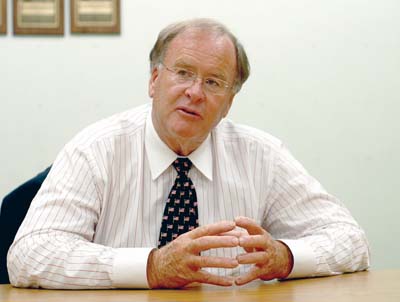
The national debate on health care arrived in full force on the
Central Coast on Monday when hundreds of supporters – and opponents
– of proposed legislation to reform health care crowded the Irvine
Auditorium of the Monterey Institute of International Studies.
By Claudia Melendez Salinas, McClatchy News Service
The national debate on health care arrived in full force on the Central Coast on Monday when hundreds of supporters – and opponents – of proposed legislation to reform health care crowded the Irvine Auditorium of the Monterey Institute of International Studies.
About 600 people showed up for Congressman Sam Farr’s town hall meeting, the first of three he’s scheduled to hold on the Central Coast, with the meeting in Hollister scheduled for Wednesday. Several of them carried protest signs outside the auditorium before and during the meeting.
The main auditorium filled up quickly and about half the audience listened to the discussion from the overflow room.
Organizers estimated that supporters “far outnumbered” opponents, but both camps were almost as loud whenever they found points they agreed with. While the loudest cheers came from the overflow room, about one-third of the audience in the auditorium could be seen clapping for speakers who disagreed with the proposed legislation.
Farr was introduced by Monterey Mayor Chuck Della Sala, who said the issue of health care would be discussed “in a very respectful and civil way.”
For the most part it was, although in spite of pleas to be quiet, the audience was quite lively. Plenty of cheers, jeers, chuckles and outright laughs could be heard at times the speakers might deem as inappropriate throughout the two-hour event.
One of the first questions Farr asked was how many people were currently insured. Almost everyone – organizers said it was 98 percent of the room – raised their hands.
“None of you are affected,” he said. “If you like what you have, you can keep it. There are 127,000 in Monterey County who have no insurance whatsoever. They’re the ones this bill is addressing.”
Small businesses don’t have the leverage to negotiate good prices to insure their employees, and the bill would allow those small companies to put their resources together, so to speak, so they would be able to offer health care.
The proposed legislation would ban insurance companies from excluding patients for having a pre-existing condition and would allow patients to buy the public option, a government-sponsored insurance. There would be four levels of insurance that would allow patients to get better coverage if they wanted to pay for it. There would be a surcharge of 1 percent on people making more than half a million dollars after taxes to pay for the plan.
Some of the details of the plan Farr explained were met with skepticism from some members of the audience.
One audience member gave a speech that covered a gamut of topics from the government bailout, the high cost of dentistry and Gandhi.
Carmel’s Loretta Davi summed up her thoughts by asking Farr “if Medicare and Medical are going broke, if the U.S. Postal service is going broke, what makes you think the government can run any program in a cost-effective way?”
She was cheered loudly.
Farr answered that, if social security had been privatized, as someone had suggested, there would be nothing left for people after the stock market crashed.
Kate Alessandri, a 30-year-old asthma patient, told Farr she belonged to the 2 percent in the audience without health care and without the possibility of ever getting it because her condition made her ineligible to receive it.
“The plan is designed to help people like you,” Farr told her.
As the two-hour meeting came to an end, Farr said he likely would schedule more town hall meetings to meet demand. He also stayed longer to ask a few more questions.








